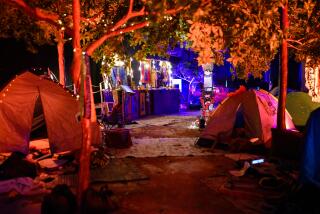Cuba detains Tania Bruguera with Havana Biennial in full swing. How will the art world react?
The latest edition of the Havana Biennial kicked off Friday, but the Cuban artist everyone is talking about does not have a piece in the show.
Tania Bruguera was once again detained by the authorities on Sunday afternoon after staging a performance at her Havana home, in which she and others read passages from Hannah Arendt’s “The Origins of Totalitarianism.” A video by the civil rights group Patriotic Union of Cuba, embedded in this post, records the moment in which state security agents approach her on the street.
Bruguera was released that same afternoon. But the detention comes at an uncomfortable moment for the Cuban government — just as the art world has descended on the 12th Havana Biennial, an event that has drawn a jet-setting group of international curators, artists and collectors to the Cuban capital for exhibitions, parties and private studio tours.
All of it raises questions about Bruguera’s continuing legal limbo. The artist is a Cuban national, but as an internationally recognized artist, she spends much of her time teaching and staging her work abroad. She returned to Cuba in December and was first detained just before New Year’s Eve for attempting to stage a performance about freedom of expression in Havana’s iconic Revolution Square.
The Cuban government hasn’t formally filed any charges against her, but Bruguera had her passport confiscated, and it has yet to be returned. For the time being, she is unable to leave Cuba.
Within the art world, there had been some online talk of a boycott in advance of the biennial — but that effort didn’t garner much steam. For the most part, the exhibition has proceeded as planned.
But artist Paul Ramirez Jonas says it’s not too late for the curators and artists who are in Havana to do something. In a Facebook status update he called on the international art community members present in Cuba to take action: “If you are in Havana please don’t act like it is business as usual — because it isn’t. Ask every government official, curator, and (why not) the artists, as well, about Tania.”
“Many of us who chose not to participate in the Biennial or related shows have done what we could from the outside,” he adds. “If you are in Cuba now is your chance to do something.”
Bruguera couldn’t be reached for comment. But in a taped interview with the a reporter from the Cuban news website Martí shortly after she was released, she sounds firm in her mission to make art that touches a nerve — whether it’s in Cuba or anywhere else.
“When they were going to take me, I turned around to everyone who was there and said, ‘Don’t shout,’” she says. “Nothing. Don’t do anything. This is nonviolent.”
Find me on Twitter @cmonstah.
More to Read
The biggest entertainment stories
Get our big stories about Hollywood, film, television, music, arts, culture and more right in your inbox as soon as they publish.
You may occasionally receive promotional content from the Los Angeles Times.











